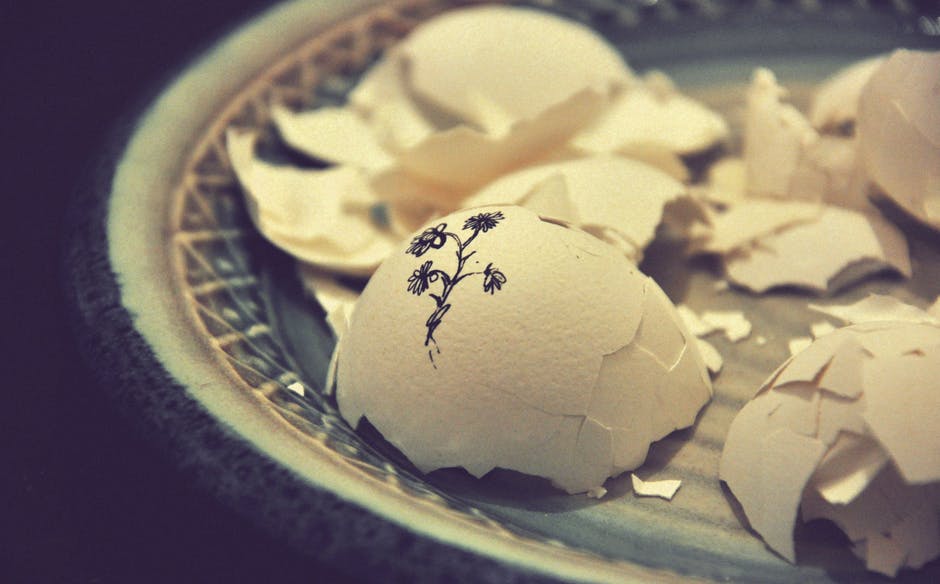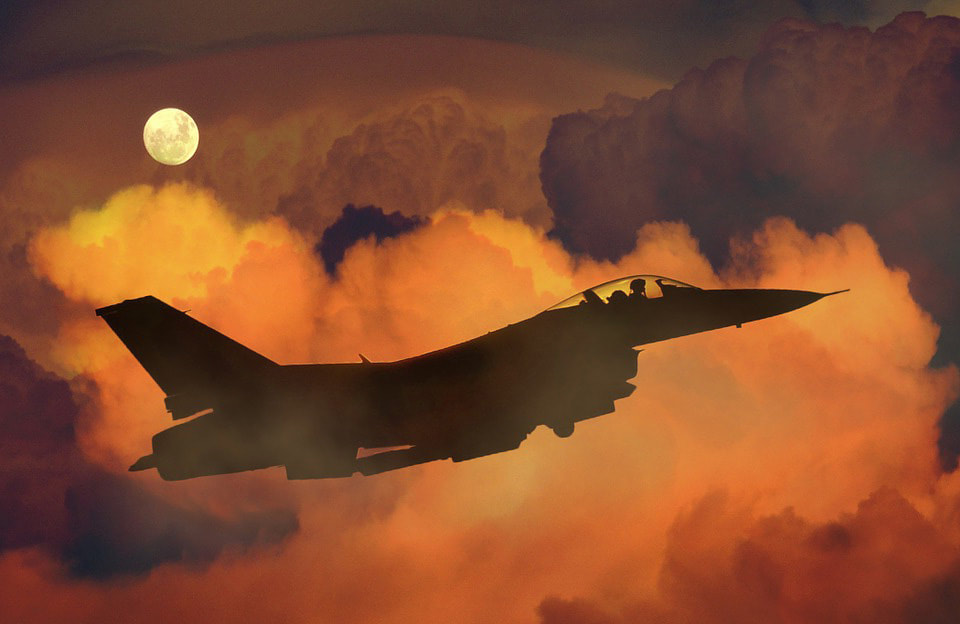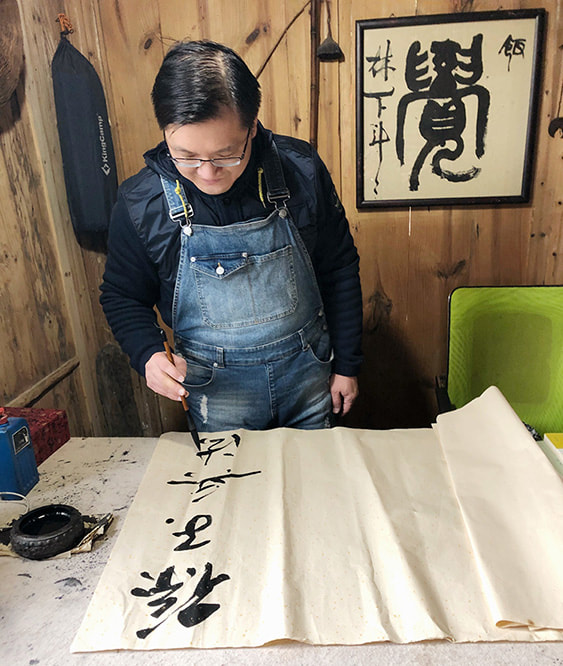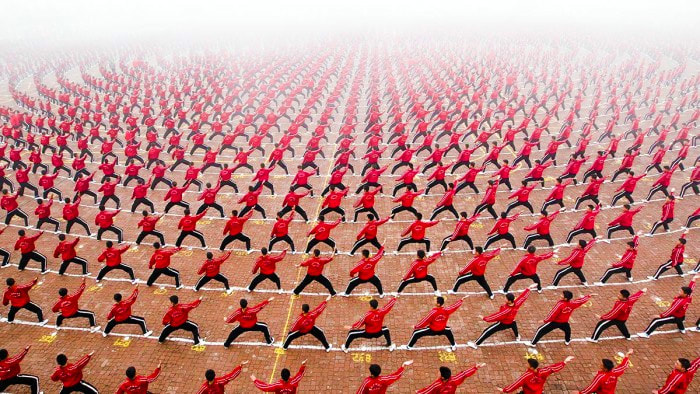Both sets of Chinese characters are hand-written specifically for Sonshi because it is our main motto. The motto translated in English is, "We don't only show you how to read Sun Tzu's Art of War. We also show you how to apply Sun Tzu's Art of War."
How wonderful Ms. Newman asked that question because I didn't realize until now you might have been curious to know what those Chinese characters meant as well. Now you know. For those new here, the "four-leaf clover" icon is Sonshi's logo and the peace sign is based on our objective of world peace, in alignment with our recent acquisition of the domain name ☮️.com.
It is also wonderful she asked that question because it gives me an opportunity to discuss more about our motto and why it is we all read Sun Tzu's Art of War. The purpose of reading Sun Tzu's Art of War isn't simply to read it, even if we can memorize it backward and forward, but to receive some kind of useful benefit from it.
I believe our motto is important because it is a useful motto. It reminds you and me to keep using Sun Tzu's Art of War as it was intended to be used: not for entertainment although it might be enjoyable but for practical life application. The book wants to earn its keep and it's been doing that for 2500 years.
Epictetus used to admonish those who would brag about how they can expound the complicated verses of Chrysippus. But all he cared about was how they were able to translate those verses into favorable changes in their everyday behavior. An analogy he used was, "Don't show me your lifting weights. Show me your muscles." Meaning, don't show me all the books you own to impress me but let me see how those books helped you in your life. Let me see your behavior, your mindset, how you treat others.
Ultimately if there is no positive change in behavior then what good are books like Sun Tzu's Art of War? I hear some people use their The Art of War book as display. One can do whatever he or she chooses with his or her own money, but a value of a book should go well beyond its price, at least more than the price of a poster.
Therefore, a good scholar would not only be knowledgeable in the concepts of an important book like Sun Tzu's Art of War but also serve as a living example of how that book has helped him or her. It is just as important to be a practitioner of a philosophy book as it is to be a serious student of it. I would argue that both are one and the same.
As a student of Sun Tzu's Art of War, I strive to apply the book each and every day. To me, that's what being a student of The Art of War is. Due to its practical principles, it's not limited to a classroom but can be expanded to a way of life. It is too important and useful of a book.
Thus, strategy would be a way of life. Self-control would be a way of life. Leadership would be a way of life. Being thoughtful and patient but at the same time decisive and to act quickly with full force to defend or gain advantage. They are all behaviors that everyone can see whether or not a person is successfully applying the book. And when I say "everyone," I don't mean necessarily the general public who would read about it in a newspaper article but would include family members as well. Wisdom, like peace and charity, starts at home.
I know Sun Tzu's Art of War works because it has a positive effect in my own life. Better is my ability to control what I can control, how proactive I am, how I view problems and opportunities, my relationships with those around me, my performance of life's endeavors. It simply makes me want to go out there and share it with everyone I meet.
From my numerous interactions with others who have read and applied Sun Tzu's Art of War, their story invariably reflects mine. They also tend to express relief to finally meet someone like me they can talk to about Sun Tzu's Art of War. Of course I happily oblige because the feeling is mutual.
How wonderful there are people from all over the world using this ancient Chinese classic to help them prepare and overcome modern life challenges with aplomb. I know how they feel. The feeling is of great satisfaction, of not only being disciplined in our actions but also taking the initiative and influencing matters outside ourselves in more predictable ways.
Like all things in life, there are no guarantees beyond our own actions. There are many and unknown factors that can outweigh our efforts. However, to fully utilize what little we do have through strategy can often be sufficient in securing significant performance gains.
For example, the difference in the additional skill level of a superior athlete is relatively small in comparison to the difference in his or her gains, whether they be in putting up great stats or securing great trust from coaches and teammates. To be more specific, it is analogous to the difference between a baseball player batting .250 versus a player batting .300 -- a difference of 5%, or about one extra base hit every five games -- but in terms of salary and stardom, that difference is out of the ballpark.
And when it comes to war, every little difference in keeping safe the lives of our service men and women is immeasurable. Sun Tzu pushes military leaders to become better by raising the strategic bar they need to clear:
"The important thing in doing battle is victory, not protracted warfare. Therefore, a general who understands warfare is the guardian of people's lives, and the ruler of the nation's security." Sun Tzu
"The enlightened ruler is prudent, the good general is cautious. This is the Way of securing the nation, and preserving the army." Sun Tzu
A sound strategy sets troops up for success. Once it is is executed, our troops would be like "boulders rolling down the hill," powerful, effortless, and unstoppable due to their positioning and momentum. The hard part of the entire endeavor is the strategic set up, which is the responsibility and duty of leadership. Leaders must not fail in this one critical task, or be faced with horrific consequences.
Speaking of horrific consequences, a prolonged campaign indicates the strategy is neither sound nor effective. In such a case, Sun Tzu would advise us to stop, regroup, and only move when an opportunity presents itself again:
"Move when advantageous, stop when not advantageous." Sun Tzu
So I urge you to go beyond reading Sun Tzu's Art of War. Reading isn't enough. Continue forward. Once your understanding is attained, take advantage of your newly gained knowledge and use it in your own life:
"I have heard of military campaigns that were clumsy but swift, but I have never seen military campaigns that were skilled but protracted." Sun Tzu
And no matter how clumsy you might feel, it is a better feeling than the feeling of failure, especially if the reason for that failure was due to your lack of preparation. You are better than that. You were born to accomplish great things. With more a higher, more stringent expectation of your performance, you can't help but prepare more. You work harder to create sound strategies, and thus be excited to take action on those strategies to achieve success.
Success might have begun with you reading Sun Tzu's writings in his 13 chapters, but it ends with you writing past those 13 chapters in your own life. Make your life's book an important and useful book, one that is always updated and improving. It would be like a great book that keeps on getting better.












 RSS Feed
RSS Feed